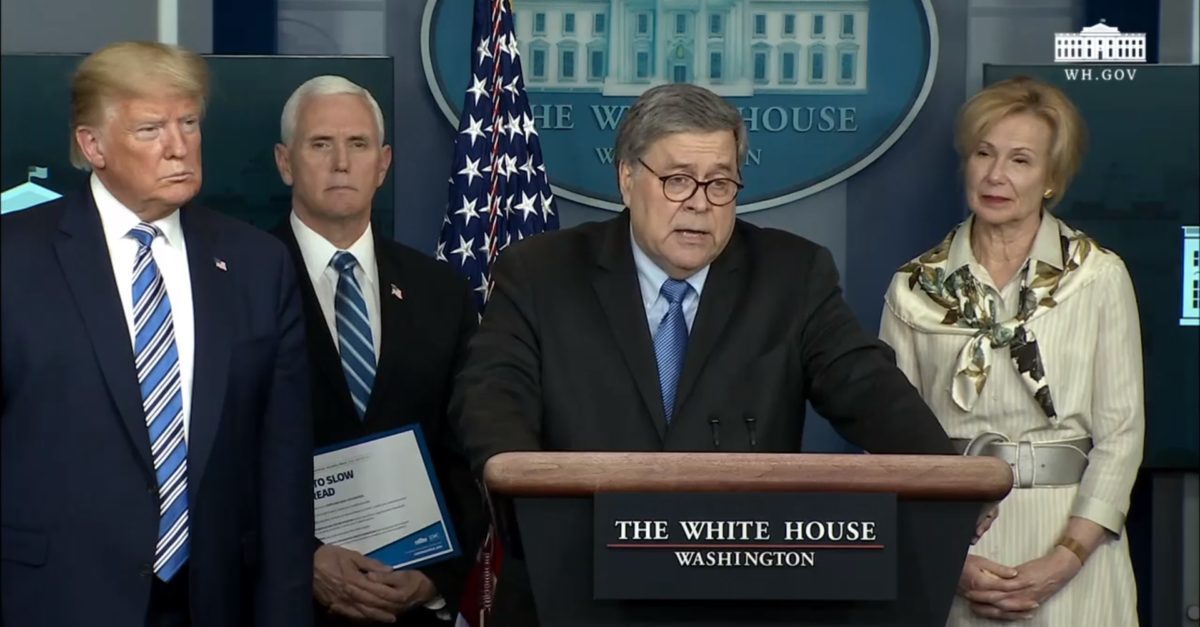
With a vow to prosecute hoarders or scam artists who seek “to exploit the suffering of American citizens for their own profit,” President Donald Trump announced a new executive order aimed at malicious conduct related to the novel coronavirus COVID-19.
Attorney General William Barr said he was working to protect the health and safety of his personnel while ensuring the law was enforced “at full throttle.” To that end, “we have started to see some evidence of potential hoarding and price gouging,” Barr said.
The new executive order addresses “hoarding that threatens the supply of those necessary health and medical resources,” he said.
The Defense Production Act allows the president to designate materials as “scarce.” Once materials are designated, the law prevents hoarding and price gouging “in excess of reasonable personal or business needs or for the purpose of selling them in excess of prevailing market prices,” Barr said. “It is a crime to engage in the prohibited activity.”
Trump said he was invoking Section 4512 of the Defense Production Act and specifically named “hand sanitizers, face masks, and personal protective equipment” as among the items he was considering for action. The statute reads:
In order to prevent hoarding, no person shall accumulate (1) in excess of the reasonable demands of business, personal, or home consumption, or (2) for the purpose of resale at prices in excess of prevailing market prices, materials which have been designated by the President as scarce materials or materials the supply of which would be threatened by such accumulation. The President shall order published in the Federal Register, and in such other manner as he may deem appropriate, every designation of materials the accumulation of which is unlawful and any withdrawal of such designation. In making such designations the President may prescribe such conditions with respect to the accumulation of materials in excess of the reasonable demands of business, personal, or home consumption as he deems necessary to carry out the objectives of this chapter.
“We have a lot of face masks, a lot of equipment just coming in, and we have some people hoarding . . . we want to prevent price gouging,” Trump said. “Critical health and medical resources are going to be protected in every form,” Trump went on to say.
Trump said the problem was of a “relatively small degree,” but that he could not allow it to go on.
Trump is delegating to the Secretary of Health and Human Services the power to designate which items precisely will be designated as scarce. Barr said the designation would come after reviews of supply chain issues. Lead prosecutors will be appointed in each U.S. Attorney’s Office to specialize in these cases, he said, but added that in some cases, investigations have already been initiated against “activities that are disrupting the supply chain and suggestive of hoarding.”
Barr said the issues go beyond what most Americans are doing while personally shopping.
AG Barr discusses measures taken by the Trump admin. to prevent price gouging and hoarding of “health and medical resources needed to respond to the COVID-19 pandemic.”
“If you are sitting on a warehouse with masks, surgical masks, you will be hearing a knock on your door.” pic.twitter.com/YIdsK0arfr
— MSNBC (@MSNBC) March 23, 2020
“We’re not talking about consumers or businesses stockpiling supplies for their own operations; we’re talking about people hoarding these goods and materials on an industrial scale for the purpose of manipulating the market and ultimately driving windfall profits,” Barr said. “If you have a big supply of toilet paper in your house, this is not something you have to worry about, but if you are sitting on a warehouse with masks, surgical masks, you will be hearing a knock on your door.”
Neither Barr nor Trump mentioned the penalties. Section 4513 of the Defense Production Act sets the penalties as up to a $10,000 fine and imprisonment of “not more than one year.”
Trump and Barr made the announcements during a daily Coronavirus briefing from the White House.
[Image via screen capture from The White House/YouTube.]